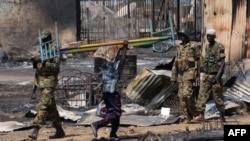The European Union on Friday published the names of two South Sudanese men it is sanctioning for obstructing peace in the country.
One of them, Peter Gadet, is the leader of a rebel militia. The other is Santino Deng, a commander in the Sudan People's Liberation Army (SPLA).
Gadet is accused of leading an attack on the town of Bentiu in April, in which more than 200 civilians were killed, some of whom were sheltering in mosques, churches and hospitals at the time of the attack.
The EU accuses Gadet of fueling violence in South Sudan, obstructing the political process, and serious human rights violations.
The United States imposed targeted sanctions on Gadet in May.
Santino Deng, SPLA commander
Santino Deng is commander of the Third Infantry Division of the SPLA. The EU says Deng violated the cessation of hostilities agreement, which was signed by the government and opposition in January, when he took part in fighting to recapture of Bentiu in May 2014.
The sanctions bar both men from travelling to European Union countries and freezes any assets they have in the EU. The sanctions will be valid for one year.
South Sudan presidential spokesman Ateny Wek Ateny said the government was taken aback at Santino's inclusion in the sanctions.
“There is no commander in the government that is obstructing peace," Ateny said.
"They fall under one command, so they all stopped (fighting) since the president signed the ceasefire agreement on the 9th of May. Even the cessation of hostilities agreement signed in January, they have been respecting it. Only they can fight in self-defense, when they are attacked," he said.
Government calls rebels EU's spoiled child
Ateny said the EU appears to be favoring rebel groups.
"They are trying to punish the wrong people," he told South Sudan in Focus.
"The government has always been committed to the peace agreement. It is the rebels who are looking like the spoiled child of the international community who can just do anything. The rebels will get away with whatever they want because the international community is not looking at them," he said.
The managing director for Africa of the EU's diplomatic corps, Nick Westcott, said the European Union imposed the sanctions because, in the face of a dire humanitarian situation and looming famine,"We could not wait any longer."
More than 10,000 people have died and more than 1.5 million have been displaced since fighting broke out in December in Juba, before spreading to other parts of the country.
Talks led by regional bloc, the Intergovernmental Authority on Development (IGAD), to restore peace were adjourned indefinitely last month amid a row over which civil society groups should have a seat at the negotiating table.
The EU has said the sanctions against Gadet and Deng are just a first step and warned that it will impose more sanctions on other officials if the two sides in the seven-month conflict do not resume peace talks soon and make a real effort to reach and stick to a peace agreement.




